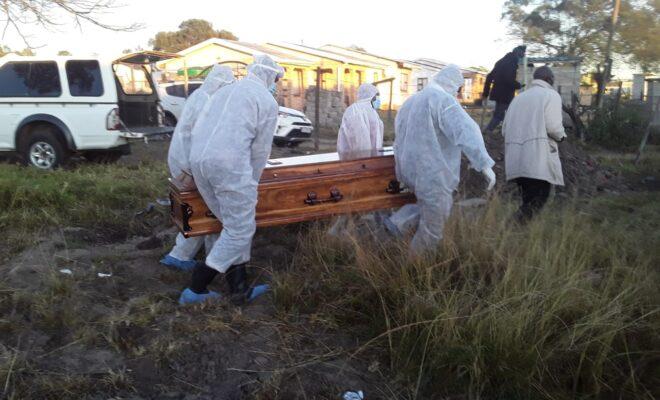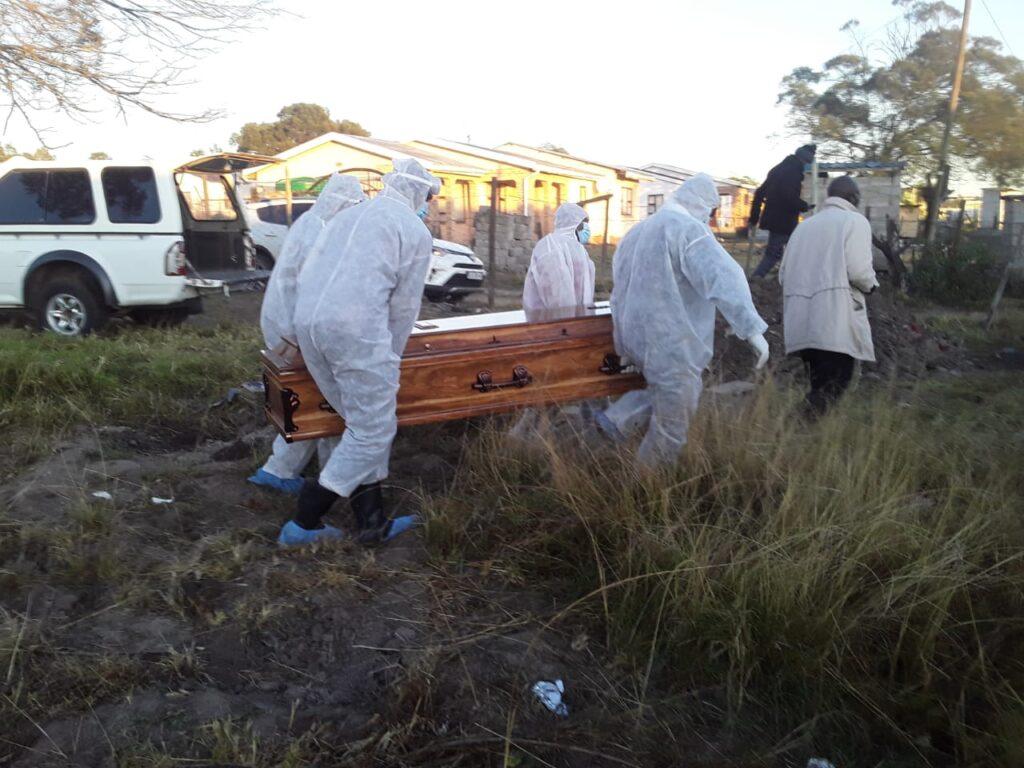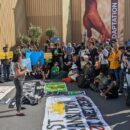
Debating Ideas is a new section that aims to reflect the values and editorial ethos of the African Arguments book series, publishing engaged, often radical, scholarship, original and activist writing from within the African continent and beyond. It will offer debates and engagements, contexts and controversies, and reviews and responses flowing from the African Arguments books.

Funeral at Bhongweni location OR Tambo district. Credit: Nelly Sharpley
On 25 January, the South African Ministerial Advisory Committee on Covid-19 released a memorandum stating that, following a re-evaluation of the evidence, dead Covid-19 bodies should no longer be deemed contagious after they have exhaled their last breath and released their final bodily fluids. It was therefore advised that it was only necessary for these bodies to be bagged in plastic from the hospital to the mortuary, but not thereafter.
The next day, the National Funeral Practitioners Association of South Africa (Nafupa SA) met with the departments of health and home affairs and then released a notice to members stating that the new ruling meant that: “we are returning to the normal way of conducting funerals” and that this would “allow families to observe their cultural beliefs”.
Nafupa told funeral parlours there was no long any need to triple-bag bodies in plastic, or prevent family and mourners from viewing and even touching the body, as it posed no significant health threat if appropriate precautions were taken. Nafupa members were also told that they no longer needed to deposit bodies at grave sites, but could now deliver them to the family home or churches. Coffins no longer needed to be cling wrapped; and quite elaborate PPE and cleaning routines which had been being performed at the place of burial could now also be abandoned.
The new dispensation amounts to a massive and unexpected reversal in policy with far-reaching implications for rural communities, whose dissatisfaction with the previous policies moved from despondency, disbelief and anger during the first wave of the pandemic in mid-2020, to open defiance of government policy as plasticised Covid-19 bodies were illegally exhumed and reburied.
Closing the gate (ukuvala isango)
This reversal in the rules governing burial practice clearly did not come easily to the bio-medical team advising President Cyril Ramaphosa. The World Health Organisation (WHO) had already stated that there was no evidence suggesting that Covid-19 corpses were infectious after death as long ago as March 2020. This position was restated in a September 2020 WHO communique. But the Ministerial Advisory Committee and the South African government were unmoved at the time, and remained committed to a position which stressed the danger of dead Covid-19 bodies.
The legacy and consequences of this decision have been traumatic and catastrophic for many rural African families, who bury their dead at homesteads or nearby cemeteries. For these families, as well as others in the cities, the key to a successful burial is “fetching the spirit” from the place of death and safely returning it home. This requires constant communication with the spirit of the deceased. This process needs to be continuous and ongoing until the body is put in the ground. There is great danger in death for the living which must be offset through communication with and care for the body.
At home in the rural areas, the body would traditionally be viewed, engaged, washed and clothed by close relatives in the homestead overnight and then buried the following day. The funeral service and burial rituals would usually last many hours, allowing religious leaders, family members, neighbours and traditional leaders to pay their respects and commune as they put the spirit to rest.
By comforting and calming the spirit in this way, the family would release it into the afterlife to commune with the ancestors. However, the regulations introduced around bagging the body and delivering it directly to the grave site; cling-wrapping coffins; and fumigating houses and grave sites, created enormous spiritual anxiety and popular anger, which traditional leaders largely ignored during the first wave as they strongly supported the Covid-19 regulations published under the Disaster Management Act. The metaphor used in rural communities across the Eastern Cape to describe the government’s approach was ukuvala isango (in Xhosa) or “closing the gate”, which referred to a process of rural people being shut out by government, even from their own cultural practices.
Exhuming bodies
As the year progressed fewer and fewer people attended funerals in rural areas in many parts of the country because they had been persuaded by the official (bio-medical) discourse that dead Covid-19 bodies could infect and kill people. Whenever Ramaphosa mentioned traditional funerals, he almost always emphasised that they were lethal, super spreader events. The police crackdown on customary practices and non-compliant funerals in rural areas was meant to reinforce this message and came as a stern warning to the residents of rural areas.
Meanwhile, the thinning crowds at rural funerals were in large part a product of the perceived inadequacy of modified burial rites to do their cultural and spiritual work. People were not motivated to attend funerals where the deceased was suffocating beneath three layers of plastic inside a shrink-wrapped coffin at a grave site where men hovered in hazmat suits, spraying gas and quickly dropped the body into the grave before leaving. How could the spirit be reached and engaged when it was so far away from the home, so trapped and enclosed? And, what would happen after the grave was sealed by the grave diggers? Would the spirit be able to escape its plastic prison and join the ancestors, or remain locked in sweaty captivity?
As families reflected on the spiritual consequences of the new rules and received messages from the ancestors in their dreams warning of the wetness and entrapment of the spirit, many felt an increasing desire to defy the government and secretly exhume the body, remove the plastics and free the spirit. These feelings intensified as the year drew to an end, and urban migrants returned to the villages over Christmas. From early December, there were reports from across the Eastern Cape of secret exhumations and reburials.
In the Chris Hani District in the north-western part of the former Transkei, a number of cases of reburial were made public in December, including that of Thembisile Faleni, a taxi driver from Nkwenkwana village in the Engcobo area who died of Covid-19 complications in July 2020. Nolusapho, Thembisile’s widow, said that within weeks of the funeral, family members started to see Thembisile appearing in their dreams complaining of suffocation caused by the plastic wraps around his body.
At the end of the year, when family returned to the village, a meeting was held and it was decided to employ 10 men to help exhume the body at night, and release the spirit by removing the plastic and reburying the corpse. This practice of liberating the spirit had become so common in the region by the end of December that a special parliamentary committee was convened to discuss the issue of illegal exhumations in the second week of January.
Traditional leaders were now also more supportive of people’s concerns, especially after renowned traditional expert, diviner and head of the Icamagu Heritage Institute, Dr Nokuzola Mndende stated that “in our tradition, there is still life even after death and so those who have passed away must be paid to rest in a respectful way”. She emphasised that the Covid-19 measures had made the “spirits of dead people unhappy”, which would in the long run have dire consequences for the well-being of the living.
Secret burials
Some traditional healers and leaders had anticipated the ensuing spiritual crisis associated with Covid-19 body bags and burials; and had recommended to their people that they employ the strategy of temporary “secret burials” used by Xhosa people in times of war. In special circumstances or times of crisis when a dignified burial was not possible, it was permitted, they reminded people, for families to bury their loved ones temporarily, often just in a blanket, without notifying the community. Subsequently, a few months later, the body could be exhumed and a proper family burial performed. Although the practice left the family spiritually exposed, it was not a problem if the reburial happened soon.
Under Covid-19 conditions, some families opted for this strategy, thinking that the pandemic would be over in a few months. But when it lingered, spiritual concerns and insecurity mounted. In one case, a family from a chiefly lineage opted for this strategy, in the knowledge that they would ideally need to invite over 100 guests for a respectful burial when the government regulations only allowed for 50. They also worried about the plastic wrapping. So, they performed a secret burial, as permitted by custom. However, members of the family soon dreamt that the spirit was unsettled, so they moved to organise a reburial in July, despite the Covid-19 restrictions. The reburial was duly performed but proved unsuccessful because the spirit returned to the dreams of the mother, complaining about being cold because he had not been dressed at the home before burial; and being wet with sweat in the plastic bag from which he could not escape. The family is now planning to conduct a third burial, at which the corpse will be dressed in appropriate clothing and freed of all plastic wrappings.
Coming home
Exhuming bodies has been quite a common occurrence in Xhosa culture, in large part as a result of a long history of displacement and migration in the Eastern Cape, which meant that many people died in far-away places, and were buried in mines, by roadsides and in urban graveyards. When this has happened, the family often hopes that it will be possible for the body to be brought home at some point to lay the spirit to rest. By grounding the spirit at the homestead, the family may enjoy the benevolence and good will of the ancestors. Such efforts to fetch the spirit tend to be made when times are bad.
In this context, many families in rural areas of the Eastern Cape are either planning or implementing plans to fetch missing bodies. For example, in the Chris Hani district in December, there were two cases in which people who had been buried away from home during the apartheid era were being exhumed and reburied close to the family. In both instances, it was explained that the danger of misfortune under Covid-19 had encouraged the family to take action now to resolve what had been a nagging concern for many years. This practice was noted in other villages too, where it was also described as a necessary measure in troubled times.
In the meantime, although the “return to normal burials” that “allow families to express their cultural rights” will be welcome in rural areas, it will not resolve the spiritual insecurity and crisis of those who remain unsettled as a result of the Covid-19 provisions. Families will continue to rebury their dead with or without the permission of government. And as the socio-economic crisis produced by the pandemic and the concomitant lockdown measures deepens, they will feel the need to travel further afield to fetch those whose spirits have not yet been brought home.





One of my relatives Harry BAZLEY was initially buried in January 1912 at Caledon, Cape Colony and his body was exhumed and reburied on 1 June 1914 at Umzinto, Natal. Would I be able to find any records of his exhumation as I would like to know the reason why.